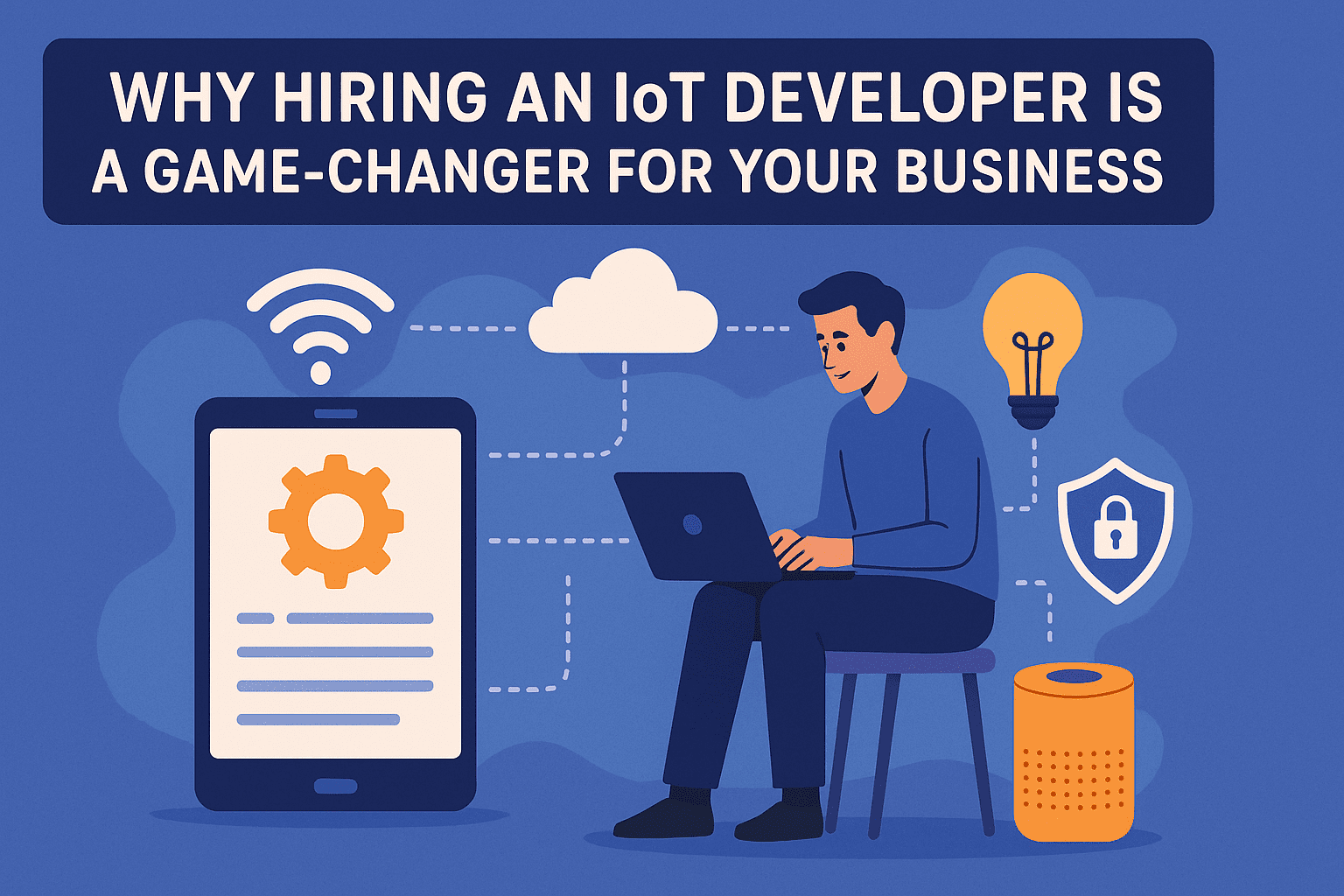Why Hiring an IoT Developer Is a Game-Changer for Your Business?

As the Internet of Things (IoT) revolutionizes industries from manufacturing and healthcare to smart homes, logistics, and agriculture, the demand for skilled IoT developers is soaring. Building a successful IoT solution requires far more than simply connecting devices—it demands expertise in hardware, software, data, security, integration, and a deep understanding of industry-specific needs. Here’s an expanded, comprehensive look at why hiring an IoT developer is a strategic decision for any forward-thinking organization—and the many unique advantages they bring to your digital transformation journey.
1. Broad Technical Mastery: From Hardware to Cloud
- Hardware Design & Integration: IoT developers are adept at working with sensors, microcontrollers, actuators, and embedded systems. They design, prototype, and integrate hardware components, ensuring devices are reliable, efficient, and tailored to your application’s needs .
- Firmware & Software Development: Their proficiency in languages like Python, Java, C/C++, and JavaScript allows them to write embedded software that controls device behavior and enables data collection and automation.
- Cloud Connectivity: IoT developers are skilled at integrating devices with cloud platforms (AWS, Azure, Google Cloud), enabling real-time data processing, remote management, and scalable infrastructure.
2. Mastery of Networking and Communication Protocols
- Seamless Device Communication: IoT developers understand networking principles and protocols such as MQTT, CoAP, HTTP, Zigbee, LoRaWAN, Bluetooth, and TCP/IP, which are crucial for secure and efficient device-to-device and device-to-cloud communication .
- Cross-Platform Integration: Their expertise allows them to connect devices from different manufacturers, ensuring interoperability across diverse IoT ecosystems.
3. Advanced Data Skills: Analytics, Visualization, and Machine Learning
- Data Modeling & Storage: IoT projects generate vast amounts of data. Developers design robust data models, work with SQL and NoSQL databases, and optimize data storage and retrieval for real-time applications .
- Analytics & Visualization: They use analytics and visualization tools to extract actionable insights, identify patterns, and drive smarter business decisions .
- Machine Learning Integration: Many IoT developers are now implementing machine learning models for predictive maintenance, anomaly detection, and intelligent automation
4. Security-First Mindset
- Robust Security Practices: IoT devices are often targets for cyber threats. Skilled developers implement encryption, authentication, secure coding, and vulnerability testing to protect data and infrastructure
- Compliance & Risk Management: They ensure your IoT solution meets industry standards and regulatory requirements, minimizing security risks and safeguarding sensitive information
5. Efficient Project Delivery and Scalability
- Rapid Prototyping: IoT developers leverage platforms like Arduino, Raspberry Pi, and AWS IoT Core to quickly build and test prototypes, reducing time-to-market
- Scalable Solutions: Their experience in designing modular, scalable architectures means your IoT system can grow with your business, handling more devices and users as needed
6. Problem Solving and Innovation
- Creative Solutions: IoT developers blend technical expertise with creativity, finding innovative ways to connect devices, optimize performance, and solve business challenges
- Continuous Learning: With IoT technologies evolving rapidly, top developers stay updated with the latest trends, tools, and best practices, ensuring your solution remains cutting-edge and competitive
7. Cross-Functional Collaboration
- Team Integration: IoT developers work closely with hardware engineers, data scientists, UX designers, and business stakeholders to deliver holistic, user-centered solutions
- End-to-End Project Ownership: From business goal definition and proof-of-concept to deployment and maintenance, IoT developers drive projects at every stage, ensuring alignment with your vision and objectives
8. Industry-Specific Expertise
- Diverse Applications: IoT developers can tailor solutions for smart homes, healthcare, automotive, industrial automation, agriculture, logistics, energy management, and more—each with unique requirements and regulatory standards
- Domain Knowledge: Their understanding of industry-specific protocols, compliance needs, and user expectations ensures your IoT solution delivers real value and competitive advantage
9. Future-Proofing with Emerging Technologies
- Edge Computing: Developers are increasingly focusing on processing data closer to the source (edge devices) for faster response times and reduced latency
- AI and Machine Learning Integration: IoT devices are now incorporating AI and ML for smarter decision-making, automation, and self-healing systems
- Smart Cities and Infrastructure: IoT expertise is critical for building the smart cities and infrastructure of tomorrow, from intelligent transportation to connected utilities
10. Career Longevity and Innovation Potential
- High Demand and Growth: The IoT field is expanding rapidly, with a robust job market and competitive salaries for skilled professionals
- Opportunities for Advancement: IoT developers can grow into specialized roles such as IoT architect, security specialist, data scientist, or product manager, leading innovation and shaping the future of technology
- Community and Networking: Many IoT developers participate in global forums and communities, staying informed about best practices and contributing to industry advancements


